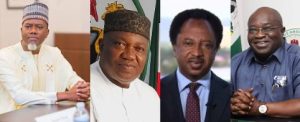UNIZIK Governing Council Debunks Purported Election of Acting Vice-Chancellor
The Governing Council of Nnamdi Azikiwe University (UNIZIK), Awka, Anambra State, has publicly denounced as false and illegal the reports circulating within the university community and beyond about the purported election of an Acting Vice-Chancellor. In a detailed statement issued by the Pro-Chancellor and Chairman of the Governing Council, Barrister Olugbenga Kukoyi, the Council described the development as not only misleading but also an affront to the legal frameworks governing the administration of federal universities in Nigeria.
The statement, which was released on Thursday in Awka, directly addressed what it called “infantile desperation” on the part of certain elements within the university. It categorically stated that no organ of the university is empowered by law to elect either an acting or substantive Vice-Chancellor, and that such powers are solely vested in the Governing Council as stipulated by extant laws.
“This act of misrepresentation is not only an academic embarrassment but a constitutional aberration,” Kukoyi said. “We urge the general public and the university community to disregard the unfounded piece of news about the purported election of an Acting Vice-Chancellor. It does not represent the true position of the state of affairs and is a blatant attempt to undermine the authority of the Governing Council.”
To clarify the legal foundation of its position, the Governing Council referenced Section 1(13) of the Universities (Miscellaneous Provisions, Amendment) Act 2003, which explicitly mandates the Council to appoint an Acting Vice-Chancellor in situations where there is a vacancy.
“Without mincing words,” Kukoyi emphasized, “this is a responsibility enshrined in law. The procedure is clear: the Senate of the University is to nominate five qualified professors, and from this list, the Council will appoint one to act as Vice-Chancellor. Any deviation from this process is not only unlawful but amounts to academic sabotage.”
YOU MAY READ
UNIZIK Caught in Contract Scandal as Acting VC Awards Same Project Twice, Second at Over Double Initial Cost
He noted that the six-month tenure of the current Acting Vice-Chancellor, Professor Joseph Ikechebelu, is approaching its expiration. Accordingly, the Council had formally requested the University Senate to convene and submit five qualified names for its consideration. However, instead of following this directive, some members of the academic community reportedly went ahead to conduct what they termed an “election.”
The announcement by the Governing Council has drawn mixed reactions from the university community. While some members of staff and students welcomed the clarification, others expressed concern over what they described as the growing tension between different power blocs within the institution.
A senior lecturer who preferred to remain anonymous said, “This whole situation shows how deeply politicized the administration of the university has become. It’s no longer about academic excellence or integrity; it’s about who controls what.”
Meanwhile, several student union leaders called for transparency and strict adherence to the rule of law. “What students need is a stable learning environment,” said Chukwuemeka Ibeh, a final-year law student. “All these internal wranglings are distractions from the real issues—improving academic standards, better infrastructure, and staff welfare.”
This is not the first time Nnamdi Azikiwe University has found itself embroiled in leadership controversies. In the last decade, the institution has witnessed multiple challenges related to succession planning, tenure expiration, and perceived interference from both internal factions and external political interests.
In 2016, for instance, the process of appointing a substantive Vice-Chancellor became mired in controversy following allegations of favoritism and manipulation. That incident led to multiple petitions and legal threats before it was eventually resolved through federal intervention.
“This current crisis is a recurrence of old wounds,” said Dr. Nneka Okafor, a former administrative officer of the university. “Unless there is a comprehensive reform in university governance, we will keep seeing these cyclical eruptions of discontent.”
The Federal Ministry of Education, under whose purview federal universities operate, has consistently maintained that the process of appointing university leadership must strictly follow the law. Any deviation, it warns, will not be recognized.
A senior official of the Ministry, who spoke on the condition of anonymity, said, “We are aware of what is happening at UNIZIK. The Governing Council has our backing to take decisive action. Anyone who purports to appoint or elect a Vice-Chancellor outside the legal framework risks severe sanctions.”
According to him, the Visitor to the University—President Bola Ahmed Tinubu—is empowered under the university laws to intervene if there is a breakdown of order or constitutional process.
Observers are divided over whether the ongoing confusion is a result of genuine misinterpretation of the law or a calculated move by certain interest groups to assert control. Some allege that the purported election was orchestrated by a coalition of senior academic staff dissatisfied with the Governing Council’s leadership style.
Others believe it may have been triggered by ethnic or regional considerations, a common undercurrent in the appointment of Vice-Chancellors across Nigerian universities. “The truth is, there are power blocs within UNIZIK, and this drama is merely a symptom of a deeper struggle for influence,” said a former student leader who has maintained close ties with the school administration.
The controversy over leadership comes at a critical time for the university. With the new academic calendar already underway, staff and students fear the ripple effect could disrupt learning activities, research programs, and administrative efficiency.
“If this is not resolved quickly and peacefully, we may see protests, work-to-rule actions by staff unions, and a general breakdown of academic activities,” said a staff union representative.
Already, the Academic Staff Union of Universities (ASUU), UNIZIK chapter, has scheduled an emergency congress to deliberate on the matter. Though ASUU has not officially commented, sources within the union suggest that they are deeply concerned about the possible erosion of university autonomy.
In light of the developments, the Governing Council has promised to enforce its statutory powers and maintain law and order within the university system. It says it will work with the relevant authorities, including the Ministry of Education, to ensure that those behind the purported election are identified and appropriately sanctioned.
“We are not here to witch-hunt anyone,” Kukoyi noted. “But we must make it clear that UNIZIK is a federal institution governed by laws and structures. No one is above the law. Anyone who attempts to act otherwise must be ready to face the consequences.”
The Council is also expected to proceed with the appointment process for the next Acting Vice-Chancellor in the coming weeks, based on recommendations from the Senate, as legally required.
In the meantime, the Pro-Chancellor called on staff and students to remain calm and focused on their academic and professional responsibilities. “The university is bigger than any individual or interest group. Our collective goal should be to build an institution that reflects the values of knowledge, integrity, and excellence,” he concluded.
As the university community waits for the final resolution of the matter, stakeholders agree on one thing: the future of Nnamdi Azikiwe University depends on how well it can uphold institutional integrity and avoid descending into factional politics and administrative anarchy.
This episode is a stark reminder of the fragile balance between academic governance and political maneuvering in Nigerian universities. As institutions meant to foster critical thinking, innovation, and leadership, universities must hold themselves to the highest standards of legal compliance and ethical conduct.
At the core of the crisis is not just a disagreement over process, but a fundamental question about power, accountability, and the rule of law. How this matter is resolved will not only shape the immediate future of UNIZIK but could also serve as a reference point for other universities grappling with similar internal governance challenges.
In the days to come, attention will remain fixed on UNIZIK’s Governing Council as it navigates this delicate transition—hoping to reaffirm the supremacy of law over expedience, and of institutional stability over political brinkmanship.
UNIZIK GOVERNING COUNCIL DEBUNKS PURPORTED ELECTION OF ACTING VC
The Governing Council of Nnamdi Azikiwe University (UNIZIK), Awka, Anambra State has debunked the news of the purported election of an Acting Vice-Chancellor.In a statement issued in Awka on Thursday by the Pro-Chancellor and Chairman of the Governing Council, Barrister Olugbenga Kukoyi, the Council said there is no enabling law or statute that permits any of the organs of the University to elect either an acting or substantive Vice-Chancellor.The statement reads in part, “We urge the general public and the university community to disregard the unfounded piece of news of the purported election of an Acting Vice-Chancellor as infantile desperation by some elements within the university community. It does not represent the true position of the state of affairs and we would not sit idly and allow some desperadoes to usurp the powers of the Council or the Visitor to the University.“Without mincing words, Section 1 (13) of the Universities (Miscellaneous Provision, Amendment) Act 2003 mandates the Governing Council to appoint an Acting Vice-Chancellor whenever there is vacancy in the office of the Vice-Chancellor.“Given the impending expiration of the six months tenure of the outgoing Acting Vice-Chancellor, Prof. Joseph Ikechebelu, the Council requested the convening of the Senate of the University to nominate five qualified professors out of which the Council will appoint an Acting Vice-Chancellor.“Instead of doing that, some elements decided to go to town with the news of the purported election of an Acting Vice-Chancellor. That is an aberration. It is unheard of. It has no basis in fact and in law. Therefore, it cannot stand. The Council urges the general public to disregard the purported appointment, as we work with all relevant stakeholders to do what is right, fair and just – in line with the rule of law and the enabling statutes.”






